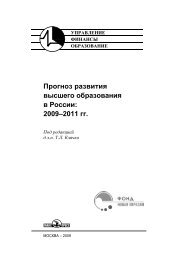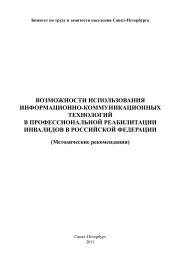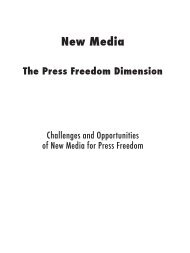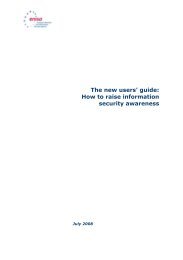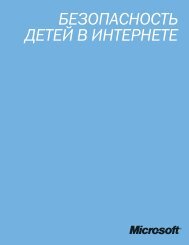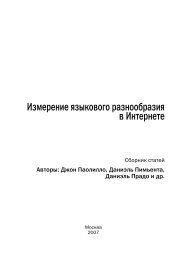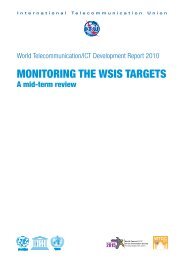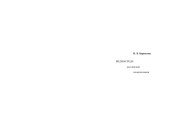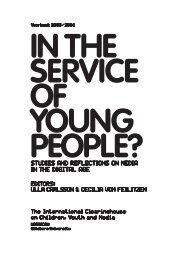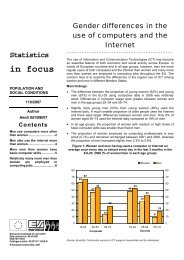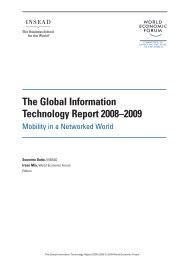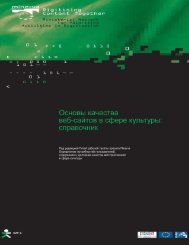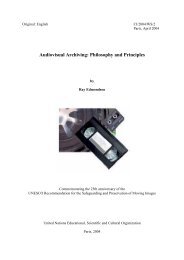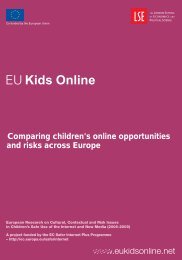Creative Economy: A Feasible Development Option
Creative Economy: A Feasible Development Option
Creative Economy: A Feasible Development Option
- No tags were found...
You also want an ePaper? Increase the reach of your titles
YUMPU automatically turns print PDFs into web optimized ePapers that Google loves.
“Fair use” began as a judge-made exception to therights of copyright owners in the United States and isapplied by the courts on a case-by-case basis, based on guidingprinciples contained in the statute. By contrast, “fairdealing” is a term that groups together a number of limitationsthat are spelled out in more detail in the statute ratherthan a general standard to be applied by courts as is the caseof “fair use” in the United States.Concerning the second proposition on raising awarenessabout less restrictive copyright licences, there is anincreasing quantity of creative products available that areoften world-class products. The most obvious examples arethe Wikipedia scheme, where the content is published mostlyunder some variant of <strong>Creative</strong> Commons or the GNUFree Documentation licenses 9 or the GNU Linux computeroperating system which, while used in for-profit activities6Box 6.3A collaborative approach to creativity and knowledgeThe role of intellectual property in the creative economyWikipedia is a multilingual, Web-based, free-content encyclopedia project. It is written collaboratively by volunteers from all around the world and its articlescan be edited by anyone with access to the Internet. The name Wikipedia is a portmanteau word combining “wiki” (a type of technology that allowsusers to update a web page using their Web browser) and “encyclopedia”. The mission of the Wikimedia Foundation, which, among other things, managesWikipedia, is to empower world citizens to share in the sum of all human knowledge. This is done by engaging people worldwide to collect anddevelop educational content under a free-content licence or in the public domain and to disseminate it effectively and globally. Since its creation in 2001,Wikipedia has grown rapidly into one of the largest reference websites. According to Alexa Internet, Inc., a company providing information on Web traffic,it is one of the 10 most visited websites in the world.In every article, links will guide the user to associated articles. Anyone is welcome to add information, cross references or citations as long as they doso within the Wikipedia editing policy and to an appropriate standard. The Wikipedia software, known as MediaWiki, is carefully designed to allow easyreversal of editorial mistakes.Because Wikipedia is an ongoing work to which, in principle, anyone can contribute and articles are “living”, it differs from a printed reference source inimportant ways. In particular, older articles tend to be more comprehensive and balanced, while newer articles may still contain misinformation, contentthat is not encyclopedic in nature, or vandalism. Users need to be aware of this so as to obtain valid information and avoid misinformation that has recentlybeen added and not yet removed. Information that remains in Wikipedia needs to be sourced. As a result, most articles have several links to primarysources, which are listed at the bottom of each article. Unlike a printed reference source, Wikipedia is continually updated, with the creation or updatingof articles on topical events within minutes or hours rather than months or years for printed encyclopedias.Wikipedia is a registered trademark of the nonprofit Wikimedia Foundation, which has created an entire family of free-content projects. On all these projects,people around the world are welcome to be bold and edit articles, contributing knowledge as they see fit in a collaborative way.Wikipedia was founded as an offshoot of Nupedia, a now-abandoned project to produce a free encyclopedia. During 2000, Jimmy Wales, founder ofNupedia, explored ways to make Nupedia a more open, complementary project. Eventually, he was introduced to the Wiki technology and Wikipedia wasborn. In 2003, Wales created the Wikimedia Foundation, a charity, essentially giving Wikipedia and its sister projects to the world. In March 2007, theword “wiki” became a newly recognized English word.There are more than 75,000 active contributors working on some 700,000 articles in more than 253 languages. As of today, there are 2,096,561 articlesin the English-language version; every day, hundreds of thousands of visitors from around the world make tens of thousands of edits and createthousands of new articles to enhance the knowledge held by the Wikipedia encyclopedia.All of the text in Wikipedia and most of the images and other content are covered by a GNU Free Documentation Licence (GFDL). Contributions remainthe property of their creators, while the GFDL licence ensures that the content is freely distributable and reproducible.Many visitors come to the site to acquire knowledge, others to share knowledge. In fact, at this very instant, dozens of articles are being improved andnew articles are being created. You can view changes as they happen. You can also view random articles. Over 1,708 articles have been designated bythe Wikipedia community as “featured articles”, exemplifying the best articles in Wikipedia. Another 2,500 articles are designated as “good articles”.Wikipedia also has portals, which organize content according to topic areas.By Sandy Ordonez, Wikimedia. Website: http://www.wikipedia.org/9 See http://creativecommons.org/ or http://www.gnu.org/copyleft/fdl.html.176 CREATIVE ECONOMY REPORT 2010



